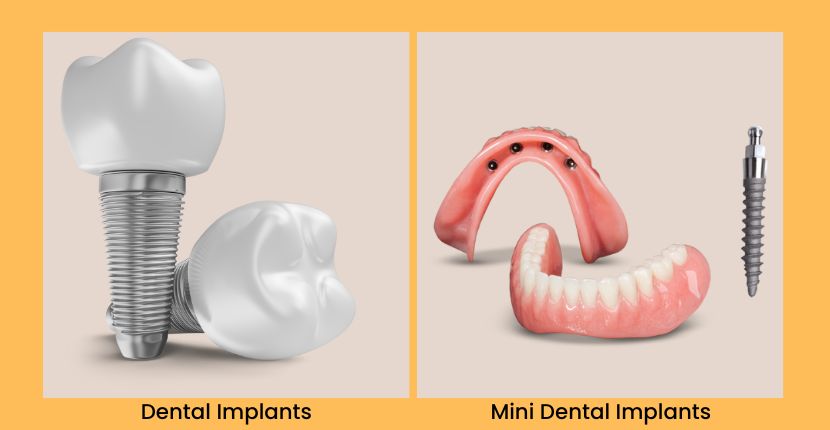10:00 AM to 8:30 PM (Mon - Sat)
10:00 AM to 2:00 PM (Sunday)
The Difference Between Dental Implants and Mini Dental Implants

The Difference Between Dental Implants and Mini Dental Implants
Missing more than one tooth can take a major toll on your confidence. It not only makes you look aged but also leads to bone loss. Thanks to modern dentistry, which has come up with revolutionary treatments like dental implants. Today, dental implants are the most sought-after solution, offering a permanent solution to restore your missing teeth. But did you know there are two main types: standard dental implants and mini dental implants? Let's break down the differences in this blog.
Implants: Building a Strong Foundation
Standard implants are like building a house with a strong, deep foundation. They are larger and provide a very stable base for your replacement tooth.
Mini implants are like building a smaller house with a less deep foundation. They are smaller and best suited for situations where a less robust foundation is needed.
Here's a closer look at the key differences:
1. Size:
Standard implants: These are wider (typically 3.5-6mm) and longer, like a small screw.
Mini implants: These are much narrower (around 2mm), about the size of a toothpick.
2. Placement:
Standard implants: It is a time-consuming process that includes surgery to place the implant into the jawbone, a healing period, and then placement of the artificial tooth.
Mini implants: They can often be placed in a single appointment with less invasive surgery. They are sometimes even placed without needing to cut the gums open.
3. Stability and Strength:
Standard implants: They offer superior stability and strength due to their larger size and deeper placement in the jawbone. They are ideal for supporting single crowns, bridges, or even full dentures.
Mini implants: Provide adequate stability for certain situations, such as replacing smaller teeth or stabilizing dentures. However, they may not be the best choice for replacing molars or for people who put a lot of force on their teeth.
4. Bone Density Requirements:
Standard implants: Require sufficient jawbone density to ensure a secure and long-lasting result. If you've experienced bone loss, you may need a bone graft before getting standard implants.
Mini implants: These can be a good option for people with less jawbone density, as they require less bone for support.
5. Cost:
Standard implants: These are generally more expensive than mini implants. The dental implant cost can range from ₹30,000 to ₹80,000 or even higher, depending on factors like the brand of implant, the materials used, the complexity of the procedure, the dentist's fees, and the location of the clinic.
Mini implants: Generally less expensive than standard implants due to their smaller size and simpler placement procedure. They typically cost between ₹15,000 to ₹40,000.
When is each type recommended?
Standard implants:
It is the preferred choice for most patients seeking a long-term, stable solution for missing teeth.
Mini Implants:
May be recommended in situations where:
- 1. There is limited bone density.
- 2. The patient wants a less invasive procedure.
- 3. Cost is a major concern.
- 4. The goal is to stabilize a denture.
Which is right for you?
Both standard and mini implants are safe and effective options for replacing missing teeth, and the best way to determine which type of implant is right for you is to consult with a qualified dentist. They will evaluate your oral health, bone density, and individual needs to recommend the most suitable option.


